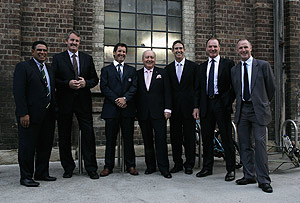
1984 Grand Slam Wallabies Mark Ella, Steve Williams, current coach Robbie Deans, Alan Jones, Roger Gould, Simon Poidevin and Andrew Slack arrive at the John Eales Medal Awards in Sydney, Thursday, Oct. 22, 2009. AAP Image/Sergio Dionisio
Some Roarers, most likely of the younger generation, have been exasperated and disparaging of older Wallabies fans dredging up former great players and teams.
Especially by comments that the 2009 Wallabies aren’t in the same league, errr make that union, as the 1984 Wallabies, who won the Grand Slam against England, Ireland, Scotland and Wales.
Fortunately, any thoughts of a comparison here are no longer relevant.
It’s a shame Australian rugby fans don’t pay more attention to their history. Ever wondered why New Zealand and South Africa continue to remain the consistently best rugby nations?
Part of the reason why Australia isn’t as consistently successful lies in poor national domestic structures that blight our progress to this day, but that’s another story for another day.
However, every time a new All Black or Springbok pulls on his country’s jersey, he is gripped by a fear of failure. A fear of failing to measure up to and maintaining the legacy of success of his predecessors.
Generally speaking, failure is not an option for the All Blacks and Springboks, and failure is seen as a great shame, even though rugby might only be a sport after all.
Australian rugby’s international record may not be of the same high standard, since we only began to be consistently successful from the 1980s onwards.
However, get away from the impersonal scorelines, and into the lives, characters and personalities of many of the individuals who have represented the Wallabies, and it’s a rich treasure-trove, believe me.
Although the Wallabies might not have been as historically successful as the All Blacks and Springboks on the scoreboard, quite often the individual stories of former Wallabies are far richer.
Read about the tragic Lonnie Spragg, or Snowy Baker, or Paddy Moran, or Tom Richards, or James Clarken, or Weary Dunlop, or Nicky Barr, or Stan Bissett, or Lloyd McDermott, or the Thornett brothers, or the Ella brothers, as just a few examples of this rich diversity.
We can ignore our history, in any field of endeavour, but only at our personal cost of knowledge, wisdom and enlightenment.
So who are our most successful Wallabies teams in history?
Usually, the 1984, 1991 and 1999 teams are put forward as the best three. The 1984 team won the Grand Slam, while the 1991 and 1999 combinations won the Rugby World Cup.
Realistically those three teams had a slightly longer reign: 1984-86, 1991-94 and 1998-2001. Personally, I prefer the 1984 team, not because they were necessarily the best, but they thrilled me the most with the breathtaking audacity of their backline play, and forward toughness.
The 1908/09 Wallabies to England and Wales, who also won the gold medal for rugby, were a good combination without being great. Britons rated them behind the 1905/06 ABs and 1906/07 Boks.
The 1927/28 Waratahs (so called because NSW was the only rugby union playing state from 1920-28) thrilled European fans with their breath-taking running rugby.
But they only won 3 out of 5 internationals.
The 1929/30 Wallabies were quite awesome, containing most of the 1927/28 mob. The beat the ABs 3-0 in 1929, and won a lone test against the Lions in 1930.
This team was led by the legendary flyhalf ‘galloping ghost’ Tom Lawton senior, whose grandson Tom Lawton junior, was hooker in the 1984 GS team.
This team also produced our first great front-row, comprising Wild Bill Cerutti at tight-head, Eddie Bonis at hooker and Eddie Thompson at loose-head.
The 1934 Wallabies won the Beldisloe Cup for the first time (inaugurated 1931) with the soon to be legendary war surgeon Weary Dunlop appearing in his second and unfortunately last test.
We didn’t win the BC again until 1949, but 30 of NZ’s best players were in South Africa. The 1947/48 Wallabies didn’t concede a try in the 4 internationals against the British and Irish teams, but overall only won 3 out of 5 internationals.
In 1963, under John Thornett’s leadership, the Wallabies split the series 2-2 with the Boks, and beat them again in both tests at home in 1965. The win at Pretoria in 1963 remains our last win at altitude in South Africa.
1975 saw a new attitude of aggression from the Wallaby pack, including famous (or infamous) names like Ray Price, Mark Loane, Tony Shaw and Steve Finnane.
Australia didn’t win the BC again until 1979 under the captaincy of the rugged Loane, and as 1980 came into view, a new generation of stars were about to build on the inconsistent but worthy success of their predecessors.
Like I said, we can ignore our history, but only at our personal cost. On the other hand, if you take the time and effort to read up on the old players and teams, there’s a rich treasure-trove waiting for you.
Us old-timers get frustrated because the current generation appear more interested in their bank balances than the rich personal history of the Wallabies jersey.





























































































